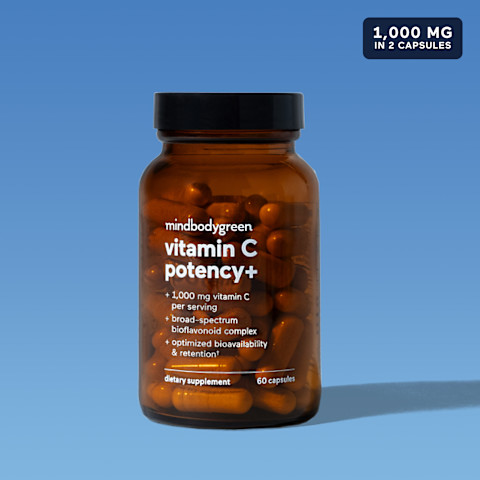
Vitamin C is an essential micronutrient that's required for a slew of vital processes in your body, including immune system function, antioxidant activity, and even cognitive and cardiovascular health.* But, despite this, many people in the U.S. have insufficient intake and circulating (i.e., blood) levels of vitamin C.
This is admittedly a little complicated to parse out. According to the nationally representative research data set from the National Health and Nutrition Examination Survey (NHANES), about 6% of American adults1 are considered frankly deficient in vitamin C, aka ascorbic acid, while a whopping 42%2 have some degree of vitamin C inadequacy (i.e., from marginal insufficiency to full-on deficiency). These prevalent numbers reflect individuals with low vitamin C status in the body based on their serum blood levels.
"However, insufficiency is not uncommon," says Alexander Michels, Ph.D., clinical research coordinator at Oregon State University's Linus Pauling Institute. "The estimates are that around 46% of adults3 are not eating enough vitamin C from food alone."
Michels explains that these statistics don't paint the full picture, either. "Studies like NHANES are evaluating people based on intake levels to prevent deficiency—not those that are considered 'optimal,'" he says. Michels points out that the Linus Pauling Institute recommends people consume at least 400 milligrams a day of vitamin C. But as it turns out, "almost nobody—less than 90% of the U.S. population—is getting this from food alone," he notes.
This is where more nutrient variety in one's diet and targeted vitamin C supplementation come in. But, of course, it's good to have an understanding of vitamin C levels and what they mean before getting yours tested via blood work with your health care provider.
If you're unsure of your vitamin C status and want to learn more about it, there are a few tests you can undergo. Here's what you need to know.
What tests are available for vitamin C levels?
If you're interested in having your vitamin C levels tested, it's time to rope in a health care professional. "Discuss with your doctor your concerns and let them advise you if they think a blood test for ascorbic acid is indicated," suggests Keri Gans, RDN, dietitian and author of The Small Change Diet.
Just know that you might get a little pushback or hesitation from your practitioner. "Vitamin C testing is rare and usually very badly done," Michels explains. In a more reactive stance (instead of a proactive nutritional assessment approach), "at the moment, doctors only test for vitamin C when they suspect you might have a deficiency," he shares.
But as holistic nutritionist Ella Davar, R.D., CDN, expounds, there is a simple blood test (aka serum ascorbic acid) to analyze your levels of vitamin C. The process is straightforward and similar to other blood tests: You have your blood drawn and it's sent to a lab for analysis.
Indeed, "there is a vitamin C blood test available from all major testing facilities," Michels explains. But, he adds, it's quite equipped to determine if you have a vitamin C deficiency—and less helpful to sensitively capture insufficiency.
Davar says that her favorite (and more specialized) blood test that can check your vitamin C levels is SpectraCell's Micronutrient Test Panel. This panel measures your levels of 31 vitamins (including vitamin C), minerals, amino and fatty acids, antioxidants, and metabolites, along with how they affect your cellular function, she explains. "This test also measures levels of glutathione and vitamin C, which I use to personalize diet recommendations for my clients," Davar says.
If you get a vitamin C blood test, Michels recommends making sure that you haven't had any vitamin C supplements for at least one day beforehand to get an accurate idea of your vitamin C status. "You should limit your intake of fruits or vegetables the night before the test—and it should be taken fasting," he says.
What do healthy vitamin C test results look like?
According to Gans, clinically "normal" levels of serum ascorbic acid are between 0.88 mg/dL and 1.2 mg/dL. Homing in on a sweet spot, Michels says an ideal level is around 1 mg/dL.
"If it's above 2 mg/dL, you probably have had some recent vitamin C intake that is still in your bloodstream, and it doesn't give you a very good picture of your status," he explains. "If it's below 0.2 mg/dL, you are considered deficient and need to take action immediately."
A blood test result between 0.2 and 0.8 mg/dL is considered to be at risk of vitamin C deficiency. Insufficiency or "hypovitaminosis C" are two other terms used to describe that gray area of insufficiency you'll want to avoid (in addition to being squarely deficient!).
The takeaway.
Even in our modern world with limes and all, vitamin C insufficiency is a much larger issue than most Americans realize. A high-quality vitamin C supplement like mbg's vitamin C potency+ that prioritizes absorption, bioefficacy4, and dosage is a great way to ensure you're getting all the C you need (plus citrus bioflavonoids) on a daily basis.*
Again, if you're concerned about your vitamin C status, partner with a health care provider that prioritizes nutrition. They should be able to help guide you on the next steps so you're maintaining healthy vitamin C levels before you know it.


